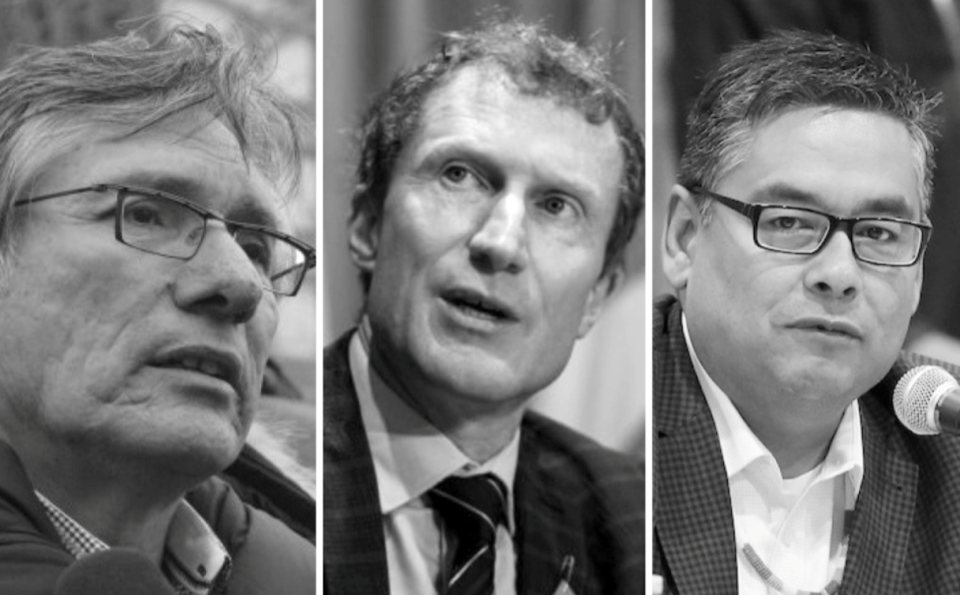A $2.8 billion settlement aims to help First Nation reclaim what the federal government stripped away through residential schools.
The settlement is a response by Canada to the first class action for collective damages to language and culture based on collective rights. It was announced Jan. 21 and builds on the 2021 Gottfriedson Day Scholars settlement.
Former Tk’emlúps te Secwépemc chief Shane Gottfriedson and former chief of shíshálh Garry Feschuk were representative plaintiffs on behalf of their respective bands in the class action. It had 325 First Nations bands opt-in. Bands eligible to be part of the legal settlement either had members who were Indian residential school survivors or who had a residential school located in their community.
“Garry and I agreed that Canada’s policy of attacking our language and culture for over 120 years had devasted our system of government and laws and seriously impacted our language…These impacts on our people were damages caused by Canada with their policy of destruction of our language and culture,” said Gottfriedson.
The result of that loss, he pointed out, was living with dysfunction and lateral violence and an inability to govern effectively.
“Canada fought us all the way to the courthouse steps and on to the halls outside the courtroom…Then 10 days before trial was to start, Canada offered to settle,” said Gottfriedson.
Crown-Indigenous Relations Minister Marc Miller, who made the announcement about the settlement, said in the past few months negotiations had been ongoing both respectfully and quietly.
“While (this) ... (does) not make up for the past, what it can do is help address the collective harm caused by Canada’s past, a deeply colonial one. A loss of language, a loss of culture, and a loss of heritage,” said Miller.
The Grand Council of the Crees (Eeyou Istchee) supported Tk’emlúps te Secwépemc and Shíshálh in their action.
“It was not enough that Canada settled this class action for First Nations. Canada must act to help First Nations recover, as well as commit to never repeating their destructive policies. This settlement agreement shows that Canada is taking responsibility for past actions and is resolving to do better in this journey of reconciliation,” said Dr. Matthew Coon Come, former grand chief of the grand council.
“The settlement is about giving our nations the support they need to pick up the broken pieces, to start healing our communities. It is about overcoming the pain of past oppression, rebuilding our societies. This is about restoring wellness in our communities,” he said.
Coon Come added that the work was not going to be easy.
“It will take years. Rebuilding our languages, our cultures, our social institutions is complicated, but it is work we need to do for our young people,” he said.
Gottfriedson called the settlement “the beginning of a new era in Canada for our people” as the use of the funding will be guided by individual First Nations in accordance with four pillars established by the plaintiff representatives: the revival and protection of Indigenous languages, the revival and protection of Indigenous cultures, the protection and promotion of heritage, and wellness for Indigenous communities and their members.
The $2.8 billion will be placed in a not-for-profit trust that will be administered by a permanent board of nine Indigenous directors. Three of the directors must be approved by each of Tk’emlúps te Secwépemc, shíshálh Nation, and the Grand Council of the Crees in advance of election or appointment. Five directors will be appointed based on regional representation and must be a member of the band class. Canada will have one director but that director will not sit as chair, vice-chair or act as chair for any meeting.
“(The board) has to be set up for the time of the implementation of the investment…(in order) to have investment advice so that the money is invested immediately,” said class counsel Peter Grant.
Initial payments of $200,000 will go to each of the 325 bands. This money will give the nations the opportunity to develop an initial 10-year plan, said Grant.
Plans will be reviewed by the not-for-profit board and an initial kick-start fund, totaling $325 million, will be disbursed. That funding will be distributed on a base rate and then based on population. Remoteness of a First Nation will also be considered in how funding is meted out.
“The timing of the delivery of that first installment will depend on each nation. Some will have their plans in place right away. Some will take some time,” said Grant.
If a First Nation needs more time, he added, their portion will be held and earn interest until they are ready to access their funding.
The initial 10-year plan will be followed by a second 10-year plan.
“The intention is after 20 years all of the funds from the trust will be dispersed,” said Grant.
While the trust itself will wind down, the not-for-profit will continue to operate for up to another 10 years in order to monitor the money and ensure it is used for one of the four pillars, he said.
However, if at 20 years a First Nation wants to invest its share of the $2.8 billion in its own trust fund for the four pillars, the not-for-profit will no longer have to monitor.
“The idea is, it’s not to create an institutional structure that lives forever. It’s to create a process by which nations will be able to move forward,” said Grant.
The settlement still needs to be approved by a judge and will be presented in the Vancouver federal court Feb. 27 to March 1. There will be a 60-day appeal period and 30 days after, the $2.8 billion will be transferred to the not-for-profit trust, said Grant.
The federal government reached an out-of-court settlement in June 2021 with day scholars focusing on survivors and their descendants, which addressed part of the Gottfriedson case.
The Gottfriedson case was launched in 2012.



